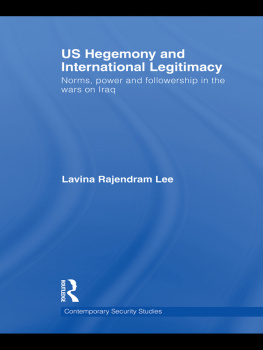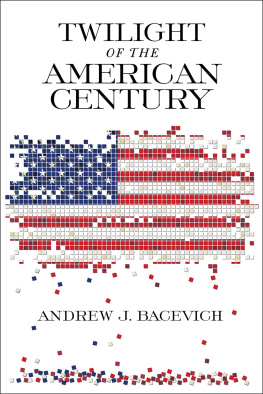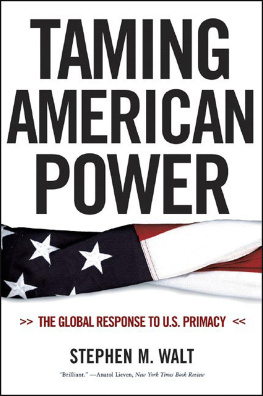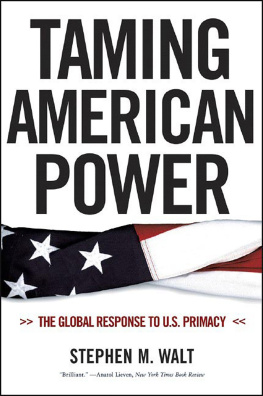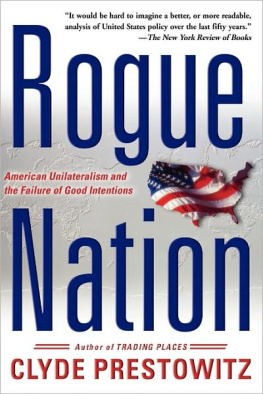GENERATIONS END
ALSO BY SCOTT L. MALCOMSON
Tuturani
A Political Journey in the Pacific Islands
Empires Edge
Travels in South-Eastern Europe, Turkey and Central Asia
One Drop of Blood
The American Misadventure of Race
GENERATIONS END
A PERSONAL MEMOIR OF AMERICAN POWER AFTER 9/11
SCOTT L. MALCOMSON
FOREWORD BY GEORGE PACKER

Copyright 2010 by Scott L. Malcomson.
Published in the United States by Potomac Books, Inc. All rights reserved. No part of this book may be reproduced in any manner whatsoever without written permission from the publisher, except in the case of brief quotations embodied in critical articles and reviews.
September l, 1939, from Collected Poems of W. H. Auden. Copyright 1940 (renewed 1968) by W. H. Auden. Used by permission of Random House, Inc., Faber and Faber, Ltd., and the Wylie Agency, LLC.
Try to Praise the Mutilated World from Without End: New and Selected Poems by Adam Zagajewski. Copyright 2002 by Adam Zagajewski. Translation copyright 2002 by Farrar, Straus and Giroux, LLC. Reprinted by permission of Farrar, Straus and Giroux, LLC, and Faber and Faber, Ltd.
Qasida for a Rose and Ode to Walt Whitman from Obras Completas (Galaxia/Gutenberg, 1996 edition) by Federico Garcia Lorca. Copyright Herederos de Federico Garcia Lorca. English translation(s) by Catherine Brown, Greg Simon, and Stephen F. White, copyright Catherine Brown, Greg Simon, Stephen F. White, and Herederos de Federico Garcia Lorca. All rights reserved. Reprinted by permission of Penguin and the Lorca estate. For information regarding rights and permissions please contact lorca@artslaw.co.uk or William Peter Kosmas, Esq., 8 Franklin Square, London W14 9UU, England.
Selected Poems of Shmuel HaNagid, translated by Peter Cole. Copyright 1996 Princeton University Press. Reprinted by permission of Princeton University Press.
The Scientist. Words and music by Guy Berryman, Jon Buckland, Will Champion, and Chris Martin. Copyright 2002 by Universal Music Publishing MGB, Ltd. All rights in the United States administered by Universal MusicMGB Songs. International copyright secured. All rights reserved. Reprinted by permission of Hal Leonard Corporation.
Library of Congress Cataloging-in-Publication Data
Malcomson, Scott L.
Generations end : a personal memoir of American power after 9/11 / Scott L. Malcomson ; foreword by George Packer. 1st ed.
p. cm.
ISBN 978-1-59797-540-7 (hardcover : alk. paper)
1. United StatesForeign relations2001-2009. 2. September 11 Terrorist Attacks, 2001Influence. 3. War on Terrorism, 2001-2009. 4. Malcomson, Scott L. 5. Mello, Srgio Vieira de, 1948-2003. 6. United Nations. High Commission for Human Rights. 7. JournalistsNew York (State)New YorkBiography. 8. United NationsBiography. I. Title.
E895.M36 2010
327.7300905dc22 2010021559
(alk. paper)
Printed in the United States of America on acid-free paper that meets the American National Standards Institute Z39-48 Standard.
Potomac Books, Inc.
22841 Quicksilver Drive
Dulles, Virginia 20166
First Edition
10 9 8 7 6 5 4 3 2 1
To my Times colleagues
and the firefighters of Engine 226,
and in memory of Sergio
CONTENTS
FOREWORD
Nine years on, we no longer live in the era of September 11. The events of that day have entered history: at some point, Americans stopped carrying their shock in their nervous systems and arguing their meaning around the clock with the intensity of life-and-death matters. The day that was supposed to change everything changed a great deal (not as much as it seemed then), but these new thingsfrom airport security to the language of jihad to the constant prospect of catastrophic attackare now ordinary features of the landscape. Two wars remain unfinished, and so do the debates about them, and their most important and permanent consequences are still not clear. But the images of American soldiers patrolling the streets of far-off Muslim countries and being hit by buried explosives have been with us for so long that their connection to the attacks that took place at the start of the millennium has grown attenuated. Americas counterinsurgencies have taken on a life and momentum of their own, so that President Barack Obama, in announcing his strategy for the war in Afghanistan at the start of his term, had to remind the public that the United States was still fighting in the region because al Qaeda was still there, too. He had to give the country a history lesson.
This passage of time lends Scott Malcomsons personal chronicle of the days and weeks and months following September 11, 2001, a peculiar power. In the hands of such an unusually thoughtful and talented writer, the special atmosphere of that time comes alive again in all its vividness: the fatal smell of ground zero, the sudden sense of fragility, the vigils and poems, the temporary insanity of being able to think and talk of nothing else and yet finding no relief in thinking and talking. It was the worst of times andin the sense that heightened consciousness is preferable to prolonged dullness and daydreamingthe best. Because Malcomson was an opinion editor at the New York Times and saw his job as a kind of civic responsibility, within the first hours he was professionally committed to reflecting on what the attacks meant for the city, the country, and the world; and those reflections remain provocative today. But before any thoughts, there are the authors sense-memories: the exhaustion of walking miles into the city to reach the office that morning, the swirl of business documents that fell like snow on Brooklyn, the hysterical laughter of grief-stricken firemen at the station across the street on the second day. These make Malcomsons account seem as fresh as ones written in the immediate aftermath. The first reason to read Generations End: A Personal Memoir of American Power After 9/11 is simply to be reminded.
But Malcomson is also writing with the advantage of history, even the short span of nine years. His book takes you from the morning of September 11, through the anthrax attacks, the overthrow of the Taliban, the turn of the Bush administration toward an aggressive new foreign policy, the lead-up to the invasion of Iraq, and its aftermath, concluding with the bombing of United Nations (UN) headquarters in Baghdad in August 2003, and the death of Sergio Vieira de Mello, the UN envoy, who had been Scott Malcomsons boss since his departure from the Times earlier that year. This period of not quite twenty-four months has the feel of a discrete chapter of the larger era, bookended by two disasters for the writer and his world: the first unexpected and immense, the last a more foreseeable result of American actions. These two years contain all the decisions that would set in motion the larger era, and because it was possible to imagine things taking a different course, the story unfolds and deepens like a tragedy.
The act of looking back with the passage of time allows Malcomson to make these events immediate and to give them the significant glow of history. Generations End is both a memoir and a historical essay, but its the second that separates this book from many other fine accounts of September 11. Malcomsons organizing structural principle is, in addition to chronology, the workings of his own mind, and because its such a supple, self-questioning, idiosyncratic mind, the book becomes a page-turner: you want to know what happens next because you want to know what the writer thinks next. He takes a familiar occurrencefor example, a presidential speechand uses it as a jumping-off point for an extended meditation, full of unexpected twists and turns and implications, on aspects of the books central theme of how America used its power after 9/11.
Next page

